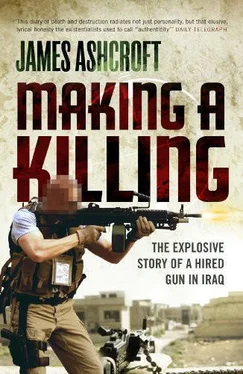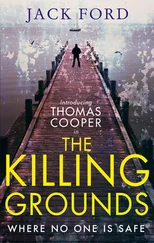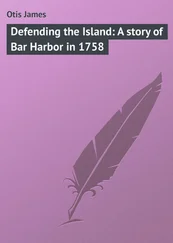On returning to the house from the filtration depot, the Yaapies set to work cooking dinner, lamb and rice, and I inspected the building work.
The walls and floor in the bathroom had been beautifully tiled, but the workmen had waterproofed the surfaces by smearing the tiles with filthy concrete and then installed the fittings by bashing holes in the tiles. Bare wires hung from the lighting and were wired directly into the mains next to the shower. The main cable from the national grid entered the house through the shower room and when I pointed out the potential danger to the electrician he promptly wrapped the fizzing lump of live wires in black tape.
Where the builders had put up a new wall, they bricked straight through the chainlink fence at the back of the office. At the back of the house, where we had five washing lines strung up, the middle two were in the way of the wall, so they bricked over them. I took some photos showing the inside and outside of the walls with the washing lines going through them. It’s a good thing the ‘cook’ wasn’t sitting there, smoking, because they probably would have bricked him into the wall as well. Two days later the steel gates fell off since they had been welded directly to the concrete wall. When Les came back off leave he was going to have a fit.
‘Come and get it,’ yelled Hendriks.
We filled our plates in the kitchen and piled into the sitting room to jostle for places in front of the big-screen television. Tonight was the final of For Love or Money 3 , where some American guy has to dismiss all these potential girlfriends based on whether he thinks they are really in love with him or are just pretending in an attempt to win the prize money. We cranked up the volume to drown out the noise of the Blackhawks thundering overhead. In this episode the guy had just sacked a lovely, distraught young lady who was genuinely in love with him and the last girl was about to reveal that actually she did not like him, it was all about the money. Forget about bombs in Baghdad◦– this was real drama.
In 1258 Genghis Khan’s grandson and his Mongol horde conquered Baghdad by walking in through the front gates. It had been a hot day and the Baghdad guards had propped their helmets up on the walls with their spears and were having an afternoon siesta. I sympathised with that long-dead Baghdad military commander as I watched the Iraqi guard outside my office nod off on his plastic chair, fag in mouth and rifle under his seat.
I had arrived back three days earlier from a great leave in which Krista had told me that she had fallen pregnant from the leave before that. We had done our sums and budgets and worked out that I could finish working for Spartan at the end of this tour and stay with her until she gave birth, before seeing about getting another contract.
My three days had already been filled with the usual Iraqi madness. In fact it had started on the flight out to Amman where the eighteen-year-old student sitting next to me talked of her plans to travel the world. When I said I was going to Baghdad she asked whether it was on holiday or business. I told her I was a tourist with an interest in Mesopotamian archaeology.
At Queen Alia airport I chatted to other PSDs about pay and leave in the queue of security men checking in to fly to Baghdad. As usual we all eyed the South African stewardesses, the last decent-looking women we’d see for a couple of months, possibly before we died, and as usual the pilot arrived over the BIAP, stood the plane on one wingtip and dropped 12,000 feet in three tight spirals, levelling out literally three seconds before the tyres kissed the runway.
I arrived at the office straight into a mess of contacts from the previous few nights. Our guards at Site Juliet had been unable to return fire because they had shot all their bullets weeks ago after Iraq beat Portugal at football, but had been afraid to request more ammunition. At Site Bravo, they had sold their ammunition and at a third site, Golf, they did have ammo but had not wanted to fire back on contact since they recognised the attackers as cousins of two of the guards and didn’t want to start a feud. We were still working out whether or not to pay compensation to the families of four guards killed at Bravo because although they had died on duty, they had been killed in a shoot-out inside the site, feuding with each other.
The second morning I found myself having to draw up yet another radio training package after a more serious mortar incident overnight at Site Alpha. Radios had been lost when guard vehicles had been hijacked and we were sure that the enemy listened in on our radio traffic. Sure enough, that night the guards ended up correcting enemy fire on to their own position, i.e. one mortar bomb landed way off target, not surprising as it was pitch black, the enemy had set up one kilometre away and was using the lights of distant radio towers as aiming markers.
‘Help, Alarm! They are shooted mortars at us! It explosions 500 metres to the south.’ Thirty seconds later another bomb landed, closer.
‘Help! This explosions only 200 metres away, they are come closer, but now to the south and the east!’ I could just picture the insurgent listening to the radio and adjusting the dials on his mortar. Thirty seconds later five bombs hit the compound directly on target.
‘Help! They are killing us! The explosions shoot directly the building! Fire is everywhere!’ Thirty seconds later, fifteen bombs hit the compound, again exactly on target, and the enemy withdrew.
Normally during emergencies no one could hear the callsigns under contact because two of the guards on more powerful base stations would be overspeaking everyone chatting about what they had for dinner, or someone would find it really cool to press transmit and hold his walkie-talkie next to the car radio so we could all listen to his favourite song.
Major Razak came in looking gloomy with his report that morning. First, Nabeel, his driver, had been arrested for carjacking. He had confessed to twelve car thefts and four murders. He had been driving around in our vehicles with our weapons permits, a shame because he was a damned good driver. Next, the road to Site Delta was currently impassable since a benzene pipe alongside it had been hit the day before. The insurgents had not done that much damage but the repair crew had. Although they were in the middle of a large lake of petrol mending a pipeline full of residue petrol and fumes, this ‘experienced’ repair crew failed to take any precautions. As soon as the welder sparked up, the fumes and then the lake ignited and exploded in a huge fireball. The locals estimated it would be at least 24 hours before the tarmac had cooled and re-solidified enough for us to use the road.
Coalition Forces, and particularly the Americans, received a lot of negative reports in the press and on TV. I was disappointed to see that the insurgents often came off in a sympathetic light. The prime example was coverage of the siege of the Imam Ali mosque in Najaf, where Moqtada al-Sadr and the active remnants of the Mahdi Army were holed up. Constant TV coverage forced the CF and the Iraqi National Guard (ING) to pussyfoot around outside because they were afraid of offending people by attacking such a holy place.
The correspondents never showed that al-Sadr had been using this holy of holies to store ammunition and weapons. Security forces were kept outside during negotiations and, while CNN and Sky News showed the terrible conditions the defenders were forced to live in, the Mahdi Army rounded up policemen, councillors, local elders, and even Shi’ite clerics who had made the mistake of denouncing al-Sadr. Away from the cameras, inside the mosque, these innocent men were beaten, tortured, sentenced in al-Sadr’s courts, then garrotted, beheaded or shot. When the siege lifted the Iraqi National Guard discovered more than two hundred bodies piled up in rooms.
Читать дальше












